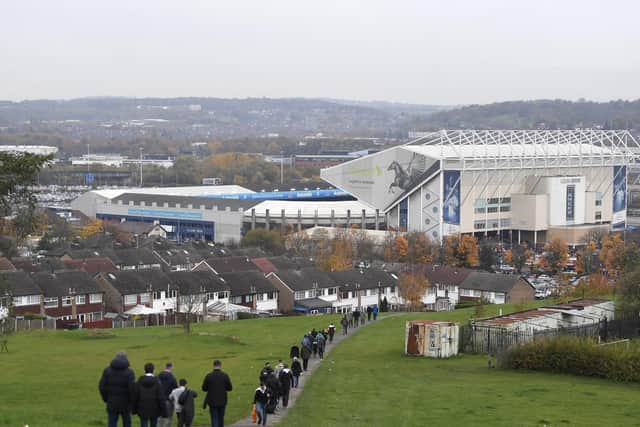How will we cope without Leeds United and bigger questions to be asked - Dan Chapman
and live on Freeview channel 276
They cancelled football. We knew it was serious when they cancelled football.
We had enough information to know the coronavirus outbreak was serious already — numbers of sick and dead in China, reports of lockdowns in Italy and hospitals in crisis.
Advertisement
Hide AdAdvertisement
Hide AdScale is hard to understand over distance, though, as with Father Ted’s famous faraway cows.
Most things still feel normal in Yorkshire, but for that one hard slap from reality that brought Covid-19 home to millions this weekend: they cancelled football.
Perhaps supermarkets would have been ransacked by amateur survivalists anyway, without Mikel Arteta’s symptoms bringing the national game to a halt. But postponing the leagues put hundreds of thousands at a loose end on Saturday and Sunday, with only one thing to do, even though it was the last thing anybody should have been doing.
Nobody needs that much toilet roll. Once upon a time, bog rolls were thrown jovially from packed terraces onto the pitch for tricky wingers to trip over. Maybe we can trace society’s changes by following an arc of Andrex: last month, throwing a roll would get you arrested and banned for aiming a missile. This month, it would be like throwing money in the air, and starting an equivalent stampede.
Advertisement
Hide AdAdvertisement
Hide AdCancelling football has hit fans hard because our comfort has gone. Football has never been like other forms of entertainment because it has a ritual element: whether at the ground, in front of the television, through the radio or on the internet, people build more durable routines around their team’s matches than they do around washing their hands.


The always-on game has always been there to fill the gaps between fanatically observed fixtures. Leeds United on Saturday is my church, but I have derived great comfort and joy over the years from my lessons at Sunday School, a radio tuned into commentaries of whatever games people might be playing.
Part of me has hated the idea of Thursday night football. Part of me relishes another night to turn the dial and tune in.
It’s not just soccer; during insomniac nights, the fluent conversation carried on over the top of televised Major League Baseball was a pillowing distraction from whatever was keeping me awake.
Advertisement
Hide AdAdvertisement
Hide AdThis uncertain time, when the only certainty seems to be increased social distancing, is the time we’ll miss those comforts the most.
The idea that, no matter how much I retune for the next few weeks, football won’t be there, still feels impossible.
It’s not only about filling idle hours. Amid isolation and quarantine, we’ll look for threads tying us together, and the loss of football has immediately cut one important way of uniting separated people.
We’ve managed through one weekend, mainly online, thanks to FIFA streams and noughts and crosses contests between football club accounts on Twitter. Contests on the pitch were replaced by competitions between social media managers, battling to generate the most engagement. Often, that part of modern football feels trite, but this felt like a return to the internet’s purpose as it was before the constant pitch of argument took over: a device for connecting people.
Advertisement
Hide AdAdvertisement
Hide AdBut memes and banter will wither without a game at their heart.
It has felt for a while like ‘content’ about the game was overtaking the game, but the transfer bait blogs are already looking forlorn. A 17-year-old Serie A starlet may well have a multi-million pound move lined up for the close season, but the ifs, buts and maybes around sport’s future make that feel irrelevant until we know when they might be able to play a game.
Just one. Imagine the bidding war today for television rights to that England vs Germany match between the First World War trenches at Christmas 1914. Right when we realise that content means nothing without the game, is right when the stadiums have fallen empty, the balls have been locked away.
What we’ll do without football feels like a big question on a relatively normal morning, when frail spring sunshine is lighting the way for people going to work, and supermarkets are restocking to mock the weekend’s hoarders. But there may be bigger questions ahead.
Advertisement
Hide AdAdvertisement
Hide AdHow will we get enough ventilators? How will NHS staff be protected? How will we look after the elderly and infirm? How will workers be paid during a lockdown? As the questions grow in seriousness and number over the coming weeks, hopefully few, we might have to forget about Leeds United’s promotion race and think again about why football was ever important.
Football has always meant hope — of winning, of going up — and while cancelled, that’s what it can still provide. Many of us are relying on football’s promise to return as a word of optimism from the other side of a crisis, for the pure feeling of throwing a bog roll at a pitch again, whatever the league tables say.
Comment Guidelines
National World encourages reader discussion on our stories. User feedback, insights and back-and-forth exchanges add a rich layer of context to reporting. Please review our Community Guidelines before commenting.